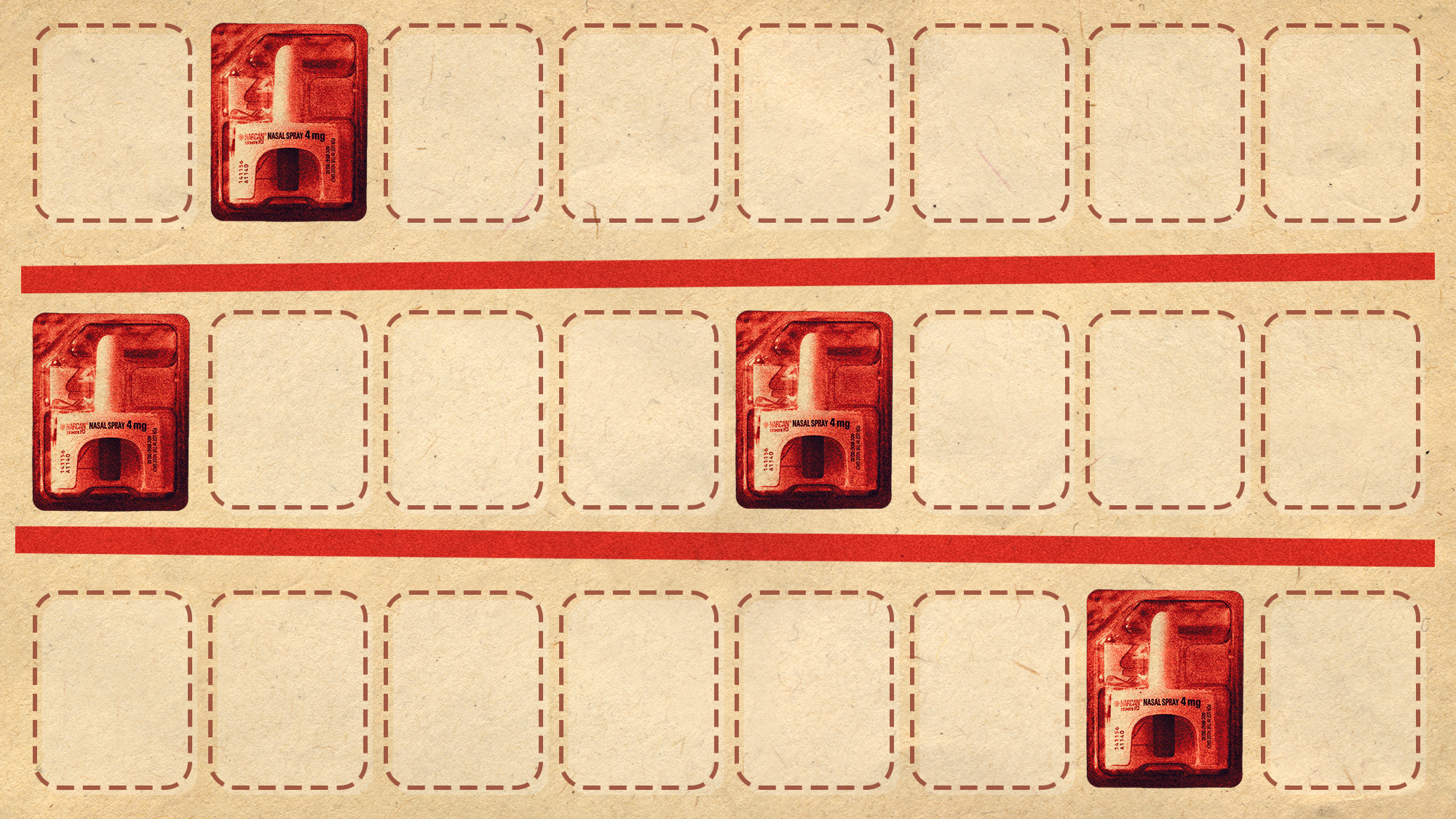Narcan is becoming harder to find at drugstores across America
The drug, also known as naloxone, reverses the effects of an opioid overdose


A free daily email with the biggest news stories of the day – and the best features from TheWeek.com
You are now subscribed
Your newsletter sign-up was successful
With the opioid crisis in the United States continuing to kill thousands of people every year, many are touting the benefits of a potentially life-saving drug: Narcan, which can prevent overdose deaths if administered quickly. But in recent months, getting your hands on a vial of Narcan has been easier said than done.
Narcan, also sold as the generic medication naloxone, can reverse the effects of opioid overdoses — including heroin, fentanyl and prescriptions — when given in time. It is sold as a two-pack of nasal spray, and unlike other overdose-reversing medications, has been approved for over-the-counter sales at drugstores. However, this also means that Narcan is susceptible to supply chain issues that can plague nationwide chains.
Narcan is already commonplace in medical settings. But anti-drug activists have long pushed for the medicine, and other versions of naloxone, to be more readily available in public places in the event of an overdose emergency. Why, then, is Narcan becoming more difficult to find, and how can its accessibility be improved?
The Week
Escape your echo chamber. Get the facts behind the news, plus analysis from multiple perspectives.

Sign up for The Week's Free Newsletters
From our morning news briefing to a weekly Good News Newsletter, get the best of The Week delivered directly to your inbox.
From our morning news briefing to a weekly Good News Newsletter, get the best of The Week delivered directly to your inbox.
Why is Narcan so hard to find?
Part of the issue, experts say, is that the rollout has been problematic — and different at locations across the country. Some stores stock Narcan "on display on the pharmacy counter; in the pain medication aisle; behind the pharmacy counter; or behind the front register," NBC News said. Sometimes, the medicine was "easy to spot and access. Other times, a customer would have to hunt or ask for help."
NBC investigated the rollout in greater detail and found that Narcan was often kept in haphazard locations at these stores. At a CVS pharmacy near Pittsburgh, it was "spotted in a locked case on a shelf marked 'Covid tests,'" NBC said, while at a Publix pharmacy in Tennessee, it was "nearly obscured" by "pamphlets advertising 'Pet meds for less.'"
And these were just the pharmacies that had Narcan in stock. A recent Rice University study into the availability of naloxone near Houston found that "of the 156 pharmacies they contacted, 71% of the Houston pharmacies [still] kept it behind the pharmacist's counters or were entirely out of the product," the Texas Tribune said.
And for addicts that do not live near a drugstore, finding Narcan can be even more difficult, if not impossible. While most major drugstores carry the drug, "none of the convenience stores or gas stations" that NBC visited did, the outlet said. Not selling Narcan in gas stations and convenience stores, which are typically ubiquitous, is a "missed opportunity," Dr. Maryam Jowza, a chronic pain expert at the UNC School of Medicine in North Carolina, said to NBC. If someone "can buy kratom at a gas station, why not Narcan?" Jowza said, referring to a pain supplement sold in the U.S. despite being unregulated.
A free daily email with the biggest news stories of the day – and the best features from TheWeek.com
Even those who can find the drug might not be able to purchase it due to rising costs. At most retail stores, a "two-dose box of nasal naloxone can run $47 to $100," the Kansas City Beacon said, while name-brand Narcan "could cost as much as $146 for a two-pack." Some insurances cover the drug — but not all, the Beacon said, meaning that "even someone with health insurance might have a hard time affording" Narcan.
How is this affecting the battle against opioid abuse?
Even as the drug has been approved for over-the-counter sales, many in the medical field have expressed skepticism that Narcan would put a dent in the opioid crisis. The Narcan approval is "not by any means a game changer," said Shoshana Aronowitz, a nurse practitioner and professor at the University of Pennsylvania, per the Philadelphia Inquirer.
The approval is a "tiny, tiny baby step that does not deserve a round of applause," Aronowitz said. When it comes to buying Narcan over-the-counter, stigmas remain that could "especially deter people who use drugs," said Lewis Nelson, the chair of the Department of Emergency Medicine and director of the Division of Medical Toxicology at Rutgers University, per the Inquirer.
"For those who don't have substance use concerns, they might go in and just ask for the product and not be concerned about what the other person’s thinking," Nelson said. But for someone with an opioid addiction, that is a "mental state that’s very hard for most of us to put ourselves into if we don’t live the life of somebody with the stigma and the marginalization that is so associated with substance use."
Justin Klawans has worked as a staff writer at The Week since 2022. He began his career covering local news before joining Newsweek as a breaking news reporter, where he wrote about politics, national and global affairs, business, crime, sports, film, television and other news. Justin has also freelanced for outlets including Collider and United Press International.
-
 ‘Restaurateurs have become millionaires’
‘Restaurateurs have become millionaires’Instant Opinion Opinion, comment and editorials of the day
-
 Earth is rapidly approaching a ‘hothouse’ trajectory of warming
Earth is rapidly approaching a ‘hothouse’ trajectory of warmingThe explainer It may become impossible to fix
-
 Health insurance: Premiums soar as ACA subsidies end
Health insurance: Premiums soar as ACA subsidies endFeature 1.4 million people have dropped coverage
-
 Scientists are worried about amoebas
Scientists are worried about amoebasUnder the radar Small and very mighty
-
 Metal-based compounds may be the future of antibiotics
Metal-based compounds may be the future of antibioticsUnder the radar Robots can help develop them
-
 A Nipah virus outbreak in India has brought back Covid-era surveillance
A Nipah virus outbreak in India has brought back Covid-era surveillanceUnder the radar The disease can spread through animals and humans
-
 Deaths of children under 5 have gone up for the first time this century
Deaths of children under 5 have gone up for the first time this centuryUnder the radar Poor funding is the culprit
-
 A fentanyl vaccine may be on the horizon
A fentanyl vaccine may be on the horizonUnder the radar Taking a serious jab at the opioid epidemic
-
 Stopping GLP-1s raises complicated questions for pregnancy
Stopping GLP-1s raises complicated questions for pregnancyThe Explainer Stopping the medication could be risky during pregnancy, but there is more to the story to be uncovered
-
 Nursing is no longer considered a professional degree by the Department of Education
Nursing is no longer considered a professional degree by the Department of EducationThe Explainer An already strained industry is hit with another blow
-
 Nitazene is quietly increasing opioid deaths
Nitazene is quietly increasing opioid deathsThe explainer The drug is usually consumed accidentally
